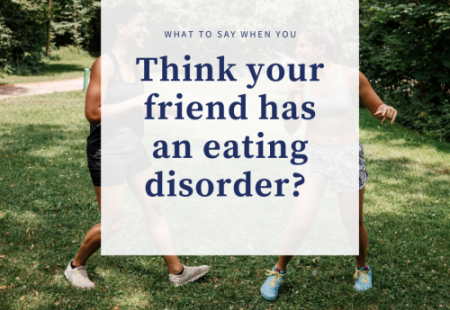
What do I do if I think my friend has an eating disorder?
I get this question a lot from friends and acquaintances. What should I say? What should I not say?
First off, thank you for caring. You’re asking the exact right question and I know you want to help your friend.
Next, you should know, just as important as what you DO say is what you DON’T say. I’ve created a cheat sheet for you so you can approach your friend with confidence and care and help her in the best way possible.
If you are a parent trying to support your child with an eating disorder, please read this post.
Here are the DOs and DONTs if you think your friend has an eating disorder:
DO
– Gently say something! Silence isn’t going to help your friend. People struggling with eating disorders are terrified of someone finding out and of asking for help.
– Approach her at a time that is outside of eating. Make your friend feel comfortable by speaking to her one on one and in a safe environment.
– Use I statements! “I care…” or “I’m concerned and love you…” When I was working in private equity, the founder of the firm pulled me aside and said “I’m worried about you. Can we talk?” Him saying this to me was what ultimately led to me finding a therapist to get help.
– Listen. Actually really listen to your friend. Ask her if it’s okay for you to ask questions. If your friend with an eating disorder doesn’t specifically tell you how to support her, ask her. “I want to support you and be a good friend – what can I do?”
– Let your friend know that you are available anytime she wants to talk. Tell her you believe in her and even though you might not fully understand, you will listen.
– Validate your friend is she shares with you. Say things like “I’m so glad you chose to share with me.”
– Sometimes it helps to share your own struggles with life. Vulnerability begets vulnerability.
DO NOT
– Comment on her weight or body! This is all off limits. Even if it’s in the form of an I statement, don’t say it. For example, do not say “I’ve noticed you lost weight.”
– Avoid using FEAR as a way of motivating your friend to heal. Most people with eating disorders know they are causing damage. Avoid saying things like: “you know that you could die.”
– Give advice. Leave that to a therapist or coach. Do support your friend in asking if there’s anything you can do to help find a therapist or coach, etc.
– Unless you’ve truly had an eating disorder yourself, avoid talking about ‘food’ or ‘exercise’ as a problem for you. This can be triggering for a friend who has an eating disorder.
– Talk about food, bodies, dieting or exercise at all unless your friend brings it up. While eating disorders appear to be about food and the body (and they are to some extent), they are usually about something much deeper.
Say something
Saying something is better than saying nothing at all. If you are truly considering talking to your friend with an eating disorder, write a script out. Here’s an example script that a client of mine used to ask her friend if she had an eating disorder:
“Hi. Would this be an okay time to talk? I first want you to know that I really care about you. I’ve felt a bit worried lately and wanted to ask if you are okay? I’d love to listen.”
What happens if you approach your friend with an eating disorder and he or she denies having an eating disorder (and maybe she doesn’t!)? It helps to have a one-liner ready in the instance that you are wrong or that your friend doesn’t want to talk about it.
I’d simply say something like, “I understand. I value our relationship too much to not say anything. I love you and hope you can forgive me.”
By saying something, you have left the door open for if and when your friend is ready to talk. Finally, visit NEDA website for more resources and a specific video on how to help a loved one with an eating disorder.